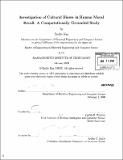Investigation of cultural biases in human moral recall : a computationally grounded study
Author(s)
Kim, Emilie
DownloadFull printable version (8.971Mb)
Other Contributors
Massachusetts Institute of Technology. Dept. of Electrical Engineering and Computer Science.
Advisor
Patrick H. Winston.
Terms of use
Metadata
Show full item recordAbstract
I hypothesize that people are experts in the morals of their culture. By "expert," I mean that people index moral stories not on the basis of superficial features, but rather on the moral itself. Not all moral stories would be indexed this way, but only stories congruent with one's culture. This moral expert hypothesis can be measured by examining how people access stored moral stories during a story recall task. Using the idea that experts show stronger analogical retrieval than novices, I investigate analogical access of culturally-based morals. I describe two pilot experiments (n = 8, n = 11) that use a collection of Eastern and Western moral stories to gather story retrieval data from people of Eastern and Western cultures. The results of these pilot experiments were unexpected. Eastern and Western subjects rate similar and sound story pairs comparably, providing supporting evidence that analogical inference is independent of culture. As hypothesized, Eastern subjects exhibit an expert retrieval effect with Eastern didactic stories (p = 0.10) and a novice pattern of retrieval with Western stories (p = 0.05). However, in contradiction of the hypothesis, Western subjects retrieve Western stories as novices (p = 0.07), which is congruent with previous research, and recall Eastern stories showing a slight expert effect (p = 0.11). The preliminary explanation suggested for these results is based on the differences in moral education in Western and Eastern culture; in Western culture, there is a lack of focused moral education, compared to the strong emphasis placed on didactic learning in Eastern culture.
Description
Thesis (M. Eng.)--Massachusetts Institute of Technology, Dept. of Electrical Engineering and Computer Science, 2009. Includes bibliographical references (p. 55-56).
Date issued
2009Department
Massachusetts Institute of Technology. Department of Electrical Engineering and Computer SciencePublisher
Massachusetts Institute of Technology
Keywords
Electrical Engineering and Computer Science.